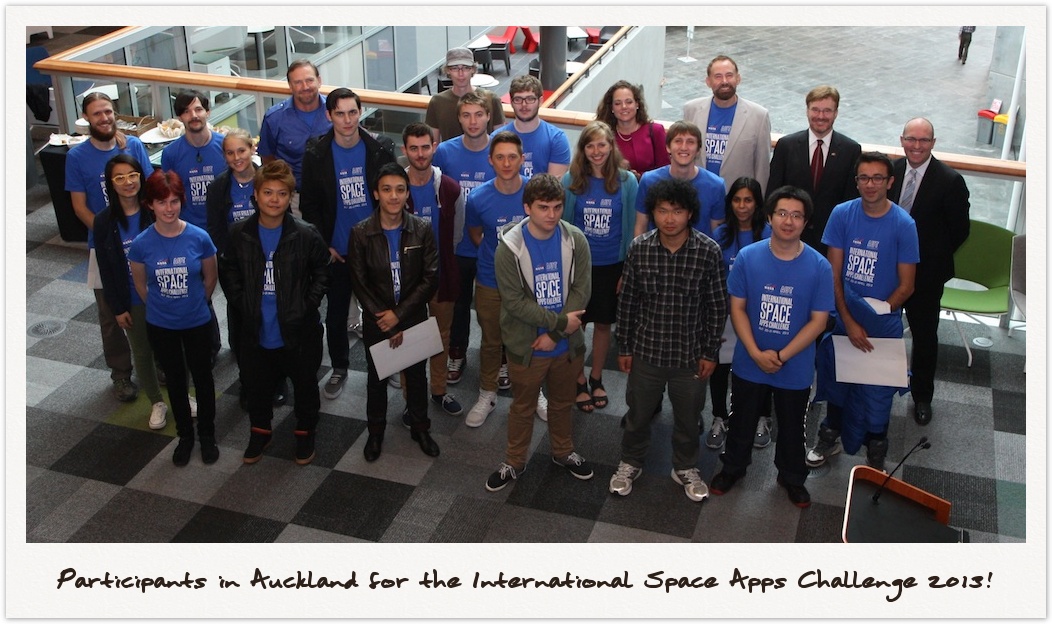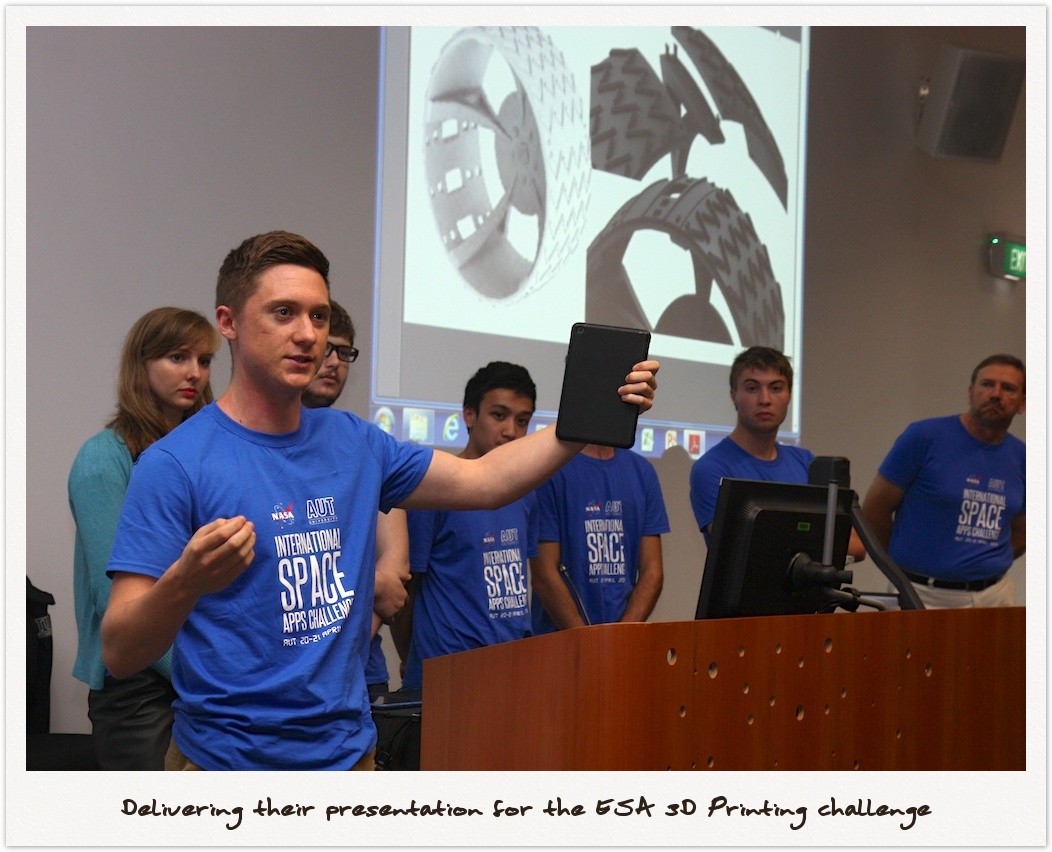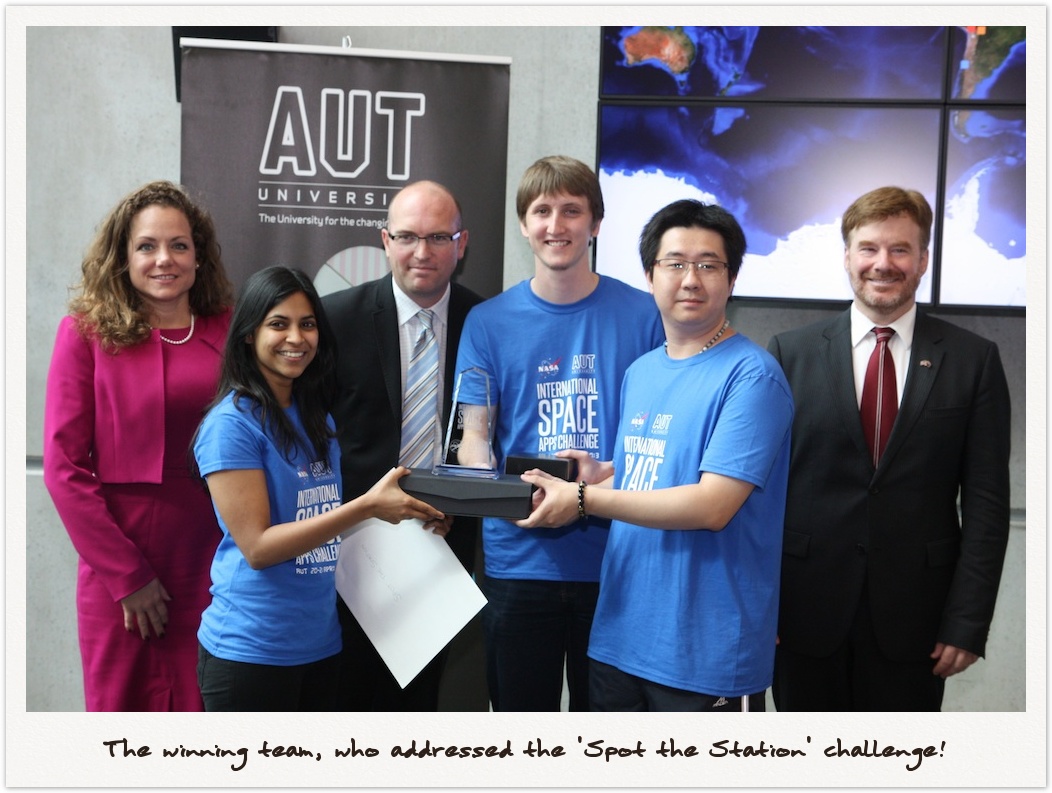| Excerpt |
|---|
Announcing the Auckland winners of the International Space Apps Challenge, and a round-up of the weekend. |
Congratulations to all teams in this year's International Space Apps Challenge! The Auckland event came to a close this morning (Mon 22 April) with team presentations and prizegiving. So who won? Read on!
The perfect opening act
By pure coincidence, at around 9am this morning NZ-time, Orbital Sciences was providing their exhilarating contribution to the Challenge programme – with the maiden launch of their Antares Rocket (a private rocket being built for NASA's commercial cargo program). If you haven't already seen it – you can watch it below:
| Widget Connector | ||||||
|---|---|---|---|---|---|---|
|
I couldn't have imagined a more perfect opening act for today's festivities. People huddled around screens in the room watching the launch and flight, until Sergei Gulyaev took the stage to kick-off the main event.
The teams had 8 minutes to deliver their pitch, and sway the judges that their entry was the best. The top two teams from NZ judging are then required to shorten their presentation to two minutes, for formal submission to NASA and the global judging round.
As could be predicted, it was some rather sleep deprived individuals that took the stage to make demonstrate their projects – but you could also sense the excitement from everyone there as they finally got to show off their concepts or product. They also had to field questions from the judges, so the teams had to be be able to defend their design choices and be ready for anything.
| Panel |
|---|
I'm in the process of processing the videos I took of the presentations - and rather than try to summarise each of the projects here, I'll post a separate blog post with each of the videos and some additional commentary and details on each of them over the next day or two. I'll get them up as soon as I can! |
There can be only one
In the end, there can be only one ultimate winner for the Auckland part of the Challenge – and that was a team of four who addressed the Spot The Station challenge.
Photographed below, the team (in the blue t-shirts) consisted of Eleanor Da Fonseca (left), Boris Feron (centre), Wayne Cen (right), and Harrison Black (who unfortunately couldn't attend this morning).
Their winning project consisted of an android application that included:
- Real-time tracking on a map of the ISS' current location
- Alerting via push-notifications when the station is approaching your location
- Sharing via social media that you've seen the ISS, and optionally a photograph of your sighting or some aspect of your experience
- Indications of other sightings in your vicinity, to promote the social-nature of such an experience
- Directional indications of where to find the ISS, overlaid on a real-time view from the camera
Much more functionality was planned, but not possible to integrate or complete within the 48-hour challenge timeframe.
See their presentation when uploaded soon for a guided demonstration.
Congratulations to all
Final placings were:
- Spot the Station team
- 3D Printing Contest - team "Space Cadets"
- Deployable Greenhouse - team "Captain Cook"
- For the Record - team "Zen Space"
While cliched, it has to be said that everyone was a winner on the day. Everyone had to come together and try to produce not only a 'product', but a presentation and overall solution that tried to meet the judging criteria in only 48 hours (and try to find time to sleep and eat).
What surprised me - and delights me - is that most of these teams were not 'space nuts' who signed up for this challenge, but rather (mostly) general students who heard about this challenge and thought 'that sounds cool to try out'. So when many arrived on Saturday morning and thought "let's design a space greenhouse" or "how would a 3D printer be useful in space" – they really were starting from scratch, and having to quickly learn things like 'will 3D printing work in microgravity?" and "what is the air pressure on Mars?", etc.
As an observer who's seen behind the curtain a bit, I can see that most of the teams struggled to achieve everything they had planned within the timeframe, and some of this extra polish and detail was left back in their labs. And there are so many wacky and amazing ideas that got tossed onto the cutting room floor, because it seemed impractical in the time or they weren't sure was scientifically viable and had no time to find out.
But ultimately this is a hackathon – and I think NASA/ESA/etc will be delighted with the outcomes. 1000s of people around the world have been introduced to the amazing world of space science and engineering, and a whole host of amazing ideas generated from this diverse community. A big congratulations to the Challenge organisers - both international and local.
See you next year?
I sure hope so! I can tell you this was an amazing event, and I want to see you here next year. KiwiSpace will be doing its best to promote it, and hopefully these blog posts will give you a bit more insight into the nature of the Space Apps Challenge – and have inspired you too.
Stay tuned – and don't forget to keep following the projects from other countries as they are released.
I'll be uploading video of each project presentation ASAP (probably Tuesday) – stay tuned!


